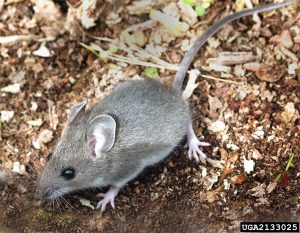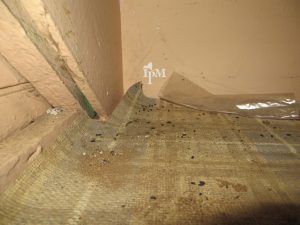Worldwide, rodents carry approximately ten diseases, most of which we’ve never heard of. Centuries ago, ‘the Plague’ spread via flea bites from infected rats. Today, most diseases spread by direct contact with a rodent or–more likely–it’s excrement (saliva, urine, or feces).
While you may not plan to touch a mouse or its droppings, you may put yourself at risk by simply inhaling microscopic particles that are released into the air when you:
- remove a dead mouse or its trap
- sweep or vacuum to remove nesting materials or droppings.

Deer mouse and white-footed mouse usually live outdoors but enter homes to forage for food.
Hantavirus, when dissipated in the air (microscopic virus clings to particles), stays alive after rodent activity. In fact, it may be viable up to fourteen days, but according the the CDC, it is more likely three to four.
How do you know?
It is difficult to determine just how old these signs of activity are, so always take precautions with your health and those around you.

No one wants to see this work ahead of them, but do you know how to protect your health while cleaning up?
Here’s the quick list of what to do to protect yourself:
- We repeat: ALWAYS TAKE PRECAUTIONS!
- Use snap traps to monitor current activity.
- Wear rubber, latex, or vinyl gloves when cleaning.
- SPRAY the urine, droppings, nest materials or carcasses with a disinfectant. The CDC recommends 1 part bleach to 10 parts water (10% solution) or a commercial disinfectant. SPRAY ENOUGH TO COMPLETELY MOISTEN THE ITEMS AND AREA.
- Use paper towels, and place everything in the garbage. (Double bagging with grocery bags can be helpful. Always double bag dead rodents.)
- After all signs of activity are removed, disinfect the area and any thing that might have been contaminated. MOP floors and DISINFECT counters with commercial disinfectant or 10% bleach solution. Toss out gloves that can’t be disinfected.
- Steam clean or shampoo upholstered furniture and hot-water wash any bedding, towels or clothing that may have come in contact with rodents. MOISTENING EVERYTHING IN YOUR CLEAN-UP AREA WILL SIGNIFICANTLY REDUCE THE OPPORTUNITY FOR AIRBORNE VIRUS TO ENTER YOUR LUNGS.
- When a significant clean-up job comes along, a cheap dust mask will not do the trick. Invest in a proper filtered safety mask. It’s worth the cost!
Hantavirus Pulmonary Syndrome (HPS) and Hemorrhagic Fever with Renal Syndrome (HFRS) are two extremely dangerous conditions you do not want to encounter. These diseases do not affect the rodents that carry (vector) them.
Even without the threat of disease, clean up work often causes breathing problems for those in and around the area. Don’t forget that cockroaches and their excrement and shed skins are also a main cause of childhood asthma.
Make proper clean-up procedures part of your IPM plan.
